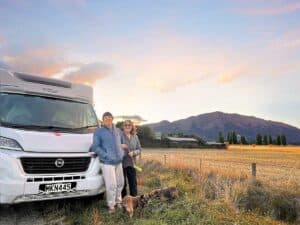So there we were, parked away from the madding crowd in a tranquil freedom-camping area on Northland’s coast. The caravan was not hard up against the beach because the bank looked soft; even so, the view out to sea and along the rocky shore was exceptional.

The evening was still and warm. We unfurled the awning, opened the wine and settled in our deck chairs for a private happy hour. And then it arrived - a highly polished, eight-metre monstrosity that in ordinary circumstances we might have admired.
But it manoeuvred side on into the space between us and the view even though there was plenty of room elsewhere. I fluffed up my feathers and started clucking; then it occurred to me that maybe after admiring the view they would move on. No, down came the steps, out came the chairs, the awning and the wine. We sat in our ruined utopia smouldering with resentment and mentally letting down their tyres and scratching their paintwork.
 |
Keep your distance when you can |
A mellowing glass of wine later, I got to thinking about the etiquette of RVing - not the rules, but the niceties. Not parking too close to another motorhome or caravan is one of them. View or noview, it’s mannerly to park thoughtfully so as not to encroach on your neighbour’s space. The New Zealand Motor Caravan Association (NZMCA) has a rule around the distance between parked RVs that is to do with fire safety as well as politeness. Each RV should be three metres from its neighbour in case one (heaven forbid) catches alight.
On the move
 |
No one likes being stuck behind an RV |
The heart-warming, ‘we’re-in-this-together’ hand wave that acknowledges other RVs on the road seems to be dwindling. This is not impolite, but its demise is lamentable. What is discourteous, however, is a slow-travelling vehicle that doesn’t pull over as soon as it’s safe.
And other road users can be driven wild when motorhomes or caravans towing vehicles travel in convoy, leaving no space for faster vehicles to pass and pull in. It is safer and considerate to keep 100m between you and the RV ahead of you. Better still, don’t travel in convoy.
Down on dumps
 |
It pays to know the rules around wastewater disposal |
RVers know that dumping grey water on the ground from the tanks is forbidden, which leads me to the subject of dump stations where decorum is essential for making one of the more unpleasant tasks of motorhoming more palatable.
One thing that really gets up the nose (literally) of fellow motorhomers is people who leave a mess. It’s only decent to think about those who are going to follow you when you’ve done what you have to do at a dump station and not leave any trace.
Tony, a fellow motorhomer, offered another good point. “When you’re emptying your cassette,” he says, “you don’t want a crowd hovering around watching - especially if things aren’t going as well as they might.” It’s impolite to stand watching while someone else does the business. Cassette-emptying is a one-person-at-a-time job.
In the dog box
 |
Most RVers welcome well-behaved pooches |
Under the heading of Ps and Qs fits the control of accompanying canines. Most RVers are tolerant of dogs if they don’t bark incessantly and are exercised on a leash. But no one wants man’s best mate lifting a leg on their matting or nicking off with a sausage from the barbie. And I can say from experience that treading in their odorous deposits and then tramping the mess onto your own patch of paradise is not conducive to a peaceful co-existence.
Social etiquette
A loose rule of thumb when visiting other RVers at ‘home’ is to call when you suspect it’s convenient and avoid meal or nap times. It’s a good idea to do a quick scout from the outside or wait until the house door is open before knocking or yoo-hoo-ing. If you are invited inside, check if your hosts want you to shed your shoes.
Another idea is to have on hand small items you can use as gifts when someone has done you a favour. There’s a spirit of generosity among the RV community, and it’s good to be part of it. This particularly applies at park-over properties (POPs), where occasionally your hosts will offer an extra service or a gift of food.
A small return gesture is always appreciated. It’s polite to book a POP ahead and let your hosts know your estimated time of arrival. Included in social etiquette is the matter of ‘domestics’. Every couple has them at some level, and it takes some adjustment to manage them in a confined space.
Arguments should be reduced to fierce whispers and fearsome facial expressions or a bit of extravagant sulking to maintain social harmony in closer confines. (If you are out in the wild, you can shout as loud as you like.)
Money-grubbing
One of my pet grumbles is about campers in DOC parks (and occasionally NZMCA parks) who don’t pay their fees. Maybe they’re not displaying their paid stickers, or some may have DOC passes that are not in evidence. But others haven’t bothered to put their hands in their pockets. Often, it’s that no one is on duty to make these absconders pay.
Why should there be? DOC doesn’t have the resources to patrol everywhere full time. “Those few who are not paying get the benefit but expect someone else to pay for them,” says Steve Taylor, DOC’s heritage and visitors director. “This isn’t fair, and we’re putting more effort into fee compliance by developing easier ways for users to pay.”
It’s all rubbish
Like me, you are probably incensed by trash that is dumped into the environment, despoiling some lovely freedom-camping areas and wayside stops. It would be wrong, however, to intimate that this is entirely caused by RVers.
There are some disgusting messes left in some places where no RV could go, or in roadside rest areas where a hideous ruination of rubbish and other horrors can be equally, if not entirely, blamed on regular vehicular traffic. I think it’s safe to say that 90 per cent of New Zealand RV owners displaying certified self-contained (CSC) stickers are not guilty of trashing their environment.
Not-so old-fashioned
Nowadays, the term minding your Ps and Qs is used to mean paying attention to your behaviour. The adage comes from the days when typesetters had to set up letters on blocks as mirror images and if they didn’t pay careful attention, it was easy for them to put a lower case ‘p’ where a ‘q’ should be (or vice versa).
Thankfully, most New Zealanders who own and travel in motorhomes and caravans have their Ps and Qs well sorted. For these polite souls, this article only serves as a gentle reminder. And I apologise to any innocent readers who happen to be travelling in a large, highly polished eight-metre bus.





